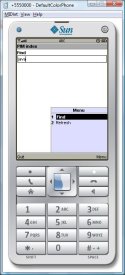A more “persistent” OODBMS adds Android support
Jan 26, 2009 — by Eric Brown — from the LinuxDevices Archive — 12 views McObject released new versions of its Linux-compatible, object-oriented embedded database for Java and .NET. Now with persistance for “any” object, the open-source Perst 4.0 and Perst Lite 4.0 enable application development in Java ME, and include sample Android applications such as the ContactsIndex, pictured… at left.
McObject released new versions of its Linux-compatible, object-oriented embedded database for Java and .NET. Now with persistance for “any” object, the open-source Perst 4.0 and Perst Lite 4.0 enable application development in Java ME, and include sample Android applications such as the ContactsIndex, pictured… at left.
(Click for larger view of Perst's ContactsIndex local search engine for Android)
Version 4.0 of the dual-licensed Perst object-oriented database management system (OODBMS) adds the ability to apply persistence to any object, claims McObject. This includes programs for which source code is unavailable, and even objects created in different programming languages, says the company.
Previous versions (see farther below) enabled the creation and management of Java and .NET objects derived from the database system's “Persistent” class, but version 4.0 extends this support to enable “foreign” objects or objects derived from any class to be stored as persistent objects in the database. Consequently, Perst can now be used to store data for existing applications including GUI classes, object-request brokers, industry-specific software, and UML modeling tools that generate classes from wizards, says McObject.
 PIMindex local search engine for JavaME (Click to enlarge) |
Mobile and embedded developers, meanwhile, can draw on Perst's new example applications: PIMindex for Java ME (pictured at right), and ContactsIndex for Android (see image at top). PIMindex and ContactsIndex leverage Perst's full-text search to offer a local search engine for contact management on a mobile device, says the company. Available with full source code, these apps are said to be modifiable to offer full-text search for PDF, word processing, HTML and other stored files. Both sample apps are included in the Java version of Perst 4.0, which also includes Perst Lite.
Perst Lite 4.0 adds EclipseME, full-text search
McObject has also upgraded Perst Lite, McObjects' “micro-footprint” version of Perst. Perst Lite is some 30 percent smaller than Perst, and with version 3.0, added new compression functions to reduce stored data's size by an average of three to five times, claimed McObject.
Perst Lite 4.0 now includes an integrated version of the EclipseME integrated development environment (IDE), as well as improved handling of memory and storage, says the company. McObject adds a sample EclipseME project to its ProScout example application, assisting in the development of Java ME (midlets) under EclipseME. It also incorporates Perst's full-text search capability, and includes the PIMindex and ContactsIndex applications mentioned above.
Additional Perst Lite enhancements include a feature that automatically selects an appropriate storage layer implementation from among Java ME Connected Device Configuration (CDC) file interfaces. Anther touted improvement is support for “weak references,” said to simplify the object caching process by allowing objects to be claimed by Java ME's garbage collection function.
Background
With a core consisting of a mere 5,000 lines of code, Perst is said to pose very little impact on system resources. Because Perst stores data directly in Java objects, says McObject, there is no need for data-packing or unpacking code to map between the application's data model and the database's data model. Perst's specialized collection classes optimized for different data layouts and access patterns are said to ease the process of accessing objects.
In June, McObject released version 3.0 of Perst and Perst Lite, adding full-text search, embedded Java compression, improved documentation, and .NET native language querying (LINQ). A year ago, McObject announced that the dual licensed Perst was verified Android compliant by the Open Handset Alliance (OHA), the industry group overseeing the Google-backed, Linux-based phone stack.
In a statement issued with version 4.0, McObject CEO and co-founder Steve Graves appeared to make reference to the recent sale of Perst's chief open-source rival, the Linux-compatible db4o, which also supports Java and .Net objects. In December, Db4objects sold the embedded DBMS to Versant Corp. then changed its company name to Servo Software, claiming a new focus on wireless data management services.
Stated Graves, “Recent industry consolidations have reduced the number of vendors specializing in embedded database technology. McObject remains dedicated to offering an open source database for Java and .NET, with characteristics such as a small footprint, zero administration and fast performance that make it ideal for embedding.”
McObject also sells a more traditional, Linux-compatible ExtremeDB embedded database that maintains a code footprint as small as 50KB, enabling it to run in memory for most embedded applications. The company sells a high availability version of ExtremeDB, and last year introduced a kernel-mode version.
Availability
Perst 4.0 and Perst Lite 4.0 for Java and .NET can be downloaded now with full source code, and should be available here.
This article was originally published on LinuxDevices.com and has been donated to the open source community by QuinStreet Inc. Please visit LinuxToday.com for up-to-date news and articles about Linux and open source.